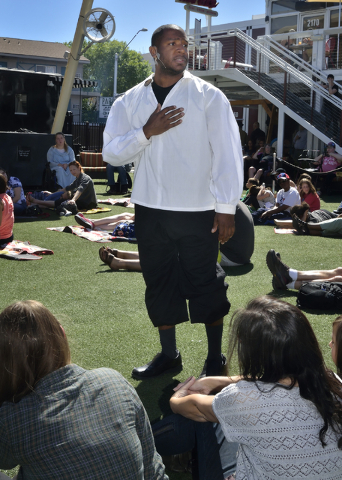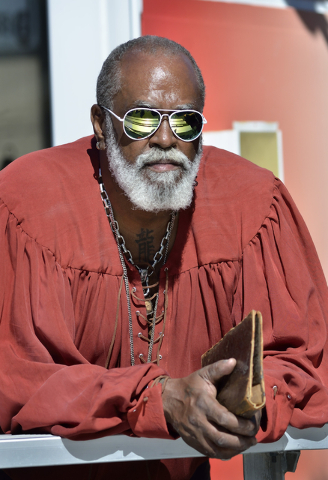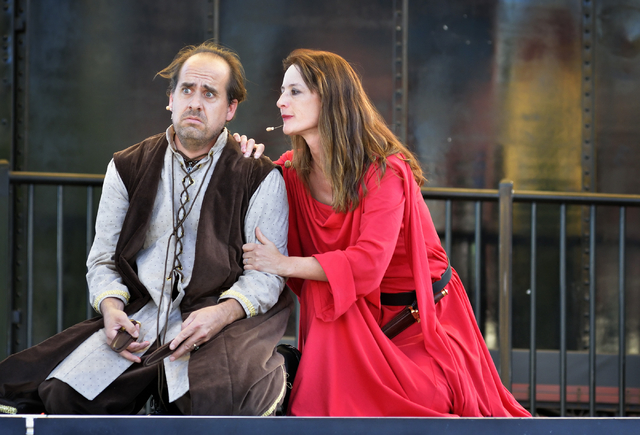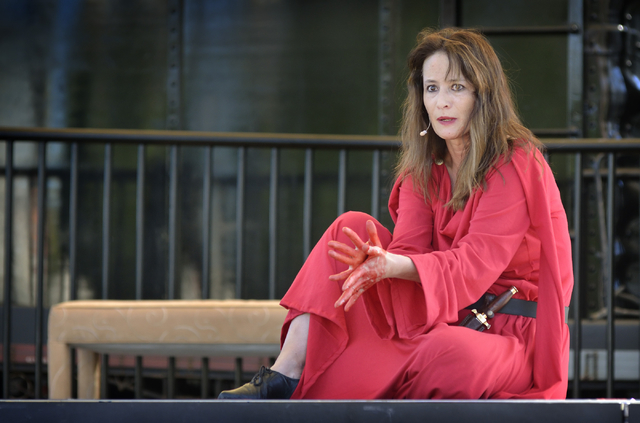400 years later, Shakespeare is still relevant
Deceit. Backstabbing. Murder. Striving for power, and how people who attain power misuse it. Life and death, love gone wrong, mistaken identity and broad humor funnier than anything today’s sitcom writers can dream up.
All can be the ingredients of either a particularly memorable day at work or a great play by William Shakespeare, who left this world 400 years ago.
But 21st century Americans can learn a lot from Shakespeare. First, there’s the beauty of a language we almost always take for granted.
“Nowhere else on Earth can you hear the English language spoken to its fullest potential, (with) words that engage our brain on multiple levels,” says Dan Decker, chairman of the Shakespeare Institute of Nevada, which performs Shakespeare for local schoolchildren and the public.
Then there’s Shakespeare’s keen understanding of diverse humanity.
“We know remarkably little about the man,” says John Bowers, an English professor at the University of Nevada, Las Vegas, who is teaching an introductory Shakespeare course this semester. “So, as a result, (a reader or audience member) can project your own values, your own interests, your own personality onto this blank screen. If you’re a feminist, you can find Shakespeare the feminist. If you’re Catholic, you can find Shakespeare the closet Catholic. If you’re gay, you can find Shakespeare the bisexual.”
“But we know so little about him as a personality and, on the other hand, his plays encompass the whole of humanity,” Bowers says.
While Shakespeare wasn’t reluctant to explore the most serious questions that a mortal can ponder, he also wasn’t averse to offering audiences often-humorous snippets of advice about the trials of daily life.
Take, for instance, “neither a borrower or a lender be” from ‘Hamlet,” says Kathy Baker, an English professor and assistant department chair of the English department at the College of Southern Nevada, or the solid-even-today advice given to Romeo and Juliet (via Friar Laurence) about the inadvisability of running off for a quick marriage.
Instead, “they make this sudden, impulsive decision to marry,” Baker says, “and, of course, it doesn’t go well.”
And how about that advice from “Henry the Sixth” to “kill all the lawyers”? Baker laughs. “I don’t know if that’s good advice or not,” she says.
But it’s the big issues that make so many Shakespeare newbies Shakespeare fans, and the biggest are “the two great universal themes: love and death,” Bowers says. “This is why ‘Romeo and Juliet’ is one of the classics.”
And, Bowers jokes, “if we can learn anything from Shakespeare, it’s that if you get the love wrong, death is one of the options.”
Shakespeare is masterful, even today, at exploring “the realities and nature of relationships,” Baker says. “What constitutes a good, solid relationship? What is a frivolous relationship.? Are there relationships that are based on things that are not lasting?”
“Who is the person to love?” Bowers says. “What are the pitfalls and traps of loving one person and not another? And death is always behind Door No. 3. Even in the comedies, very often the threat of death is hovering over one of the characters in the play.”
Another lesson from Shakespeare: The world is a complicated place filled with people who aren’t as one-dimensional as you might think they are.
Decker says Shakespeare is unique in having crafted all of his chracters, be they “beggers or villains or heroes,” with “great love.”
“There are no bad people in Shakespeare. Even the biggest villains of all explain why they’re villains, and they become human, where all of the other writers at the time felt free to just bash (minority characters) or whoever they felt like,” Decker says.
Even Shylock from “The Merchant of Venice,” is given by Shakespeare “the most eloquent, soaring defense of his humanity that wouldn’t even occur to another writer to write at that time,” he says.
“And it’s the same thing with women,” Decker says. “Women (in Shakespeare) are spectacular and powerful people. We don’t even do that in our movies today.”
Shakespeare “throws nobody away,” Decker says. “There are no people used as props.”
Shakespeare also can teach us about power and what happens when it’s deceitfully obtained and badly used. Mindy Foster, who teaches English at Cortney Junior High School in Las Vegas, says Shakespeare allows her students to think about, for example, “can power ever be truly associated with, I guess, acceptable means?”
Exhibit A: Lady Macbeth. Foster says students are fascinated by “what she does and how she will do anything to take power.”
Shakespeare reveals in his work a jaundiced view of power, Baker says. “I think we see it in ‘Macbeth’ with Lady Macbeth, who goads (Macbeth) on” and which “ultimately leads to total destruction.”
In fact, Shakespeare is a master of looking at how things can go so wrong so quickly. Bowers notes that many of Shakespeare’s characters “get in trouble by not acting right.
“They murder their way to power. They marry for wrong reasons. They marry against their parents. Whether it’s comedy or tragedy, they make a mistake that everybody knows is a mistake and they make it anyway and the audience waits for the inevitable consequences of the mistake.”
Another lesson: It’s OK to examine the big questions. Hamlet spends most of his play thinking about life and death and fate, and “it is rare that you see that depth of human experience brought forward,” Decker says.
Shakespeare “does two things better than anybody,” Decker adds. “He explores the human soul in great depth and he renders it in the most beautiful language ever. So it’s two separate things he does, and you put them together and you have the greatest writer that ever lived.”
Shakespeare’s value, even today, is that he’s so adept at exploring “the bottomless ocean of understanding the human condition,” Decker says.
“He got human beings right,” Bowers says. “He got human beings at their center. It’s all about love and death. Everybody wants love and they want to avoid dying, and those basic human impulses don’t go away.”
Read more from John Przybys at reviewjournal.com. Contact him at jprzybys@reviewjournal.com and follow @JJPrzybys on Twitter.








































